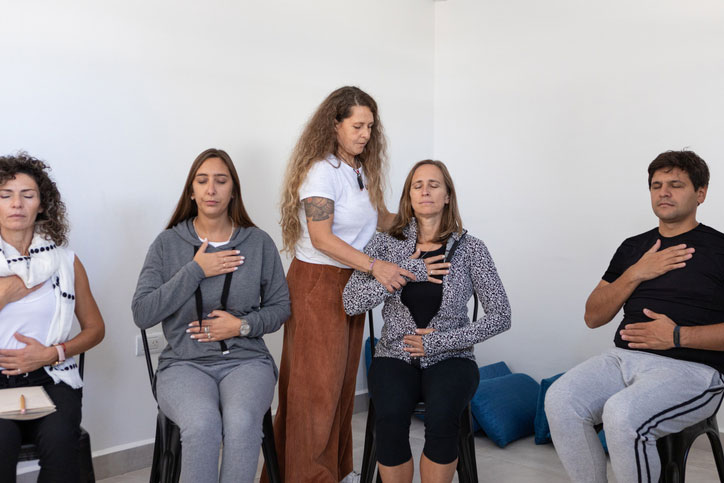Written by Dr. Emily R. Thornton, PhD, LCADC , Last Updated: November 7, 2025
Yes, you can become a substance abuse counselor without a four-year degree. Options include peer support specialist roles (available in 47 states), substance use disorder technician positions (19 states), and certificate programs leading to full counseling credentials (29 states). Requirements range from 40 to 300 training hours, plus supervised experience.
Table of Contents
- Why Degrees Aren't Always Necessary in Addiction Therapy
- The Case for Substance Abuse Counselors Without College Degrees
- Types of Addiction Counseling Jobs You Can Reach Without a Degree
- Option One: Peer Counselors and SUD Technicians
- Steps to Become a Licensed Peer Counselor or SUD Technician
- Option Two: Certificate Programs for Full Counseling Credentials
- Taking It All the Way: Advanced Clinical Practice Without a Degree
- Frequently Asked Questions

The American opioid epidemic is an all-hands-on-deck disaster. According to the Centers for Disease Control (CDC), more than three-quarters of all drug overdose deaths in 2021 involved an opioid. Those deaths are skyrocketing—over 80,000 that year alone, a 14 percent jump from 2020.
Those are just the national rates. Some areas are much worse. Rural areas of West Virginia and Tennessee may experience death rates three times the national average. Opioids are just one drug, and death is just one piece of a larger pattern of despair and disease laid down over the country by addiction.
It's a situation that calls for every possible contribution that willing substance use disorder professionals can make. That includes those without a college degree. The options are to start in an entry-level tech or peer counselor role, or complete a short-course certificate program in states where a degree isn't required.
Addiction Therapy Is a Rare Profession in Human Services Where Degrees Aren't Always Necessary
It's increasingly unusual to find solid jobs in the United States that don't require a college degree. According to the Georgetown University Center on Education and the Workforce, in the 1980s, there were more positions available for people without a high school education than for college graduates.
But in 2021, the situation was completely flipped, with 36 percent of positions requiring at least a bachelor's degree. By 2031, it's expected to be 42 percent. That's especially true in human services fields like counseling and social work.
The top-level credentials for licensed social workers (LSWs) and licensed mental health counselors (LMHCs) almost always require a master's degree. That's six years of study and usually tens of thousands of dollars, putting those credentials out of reach for many people.
That's become increasingly true in addiction counseling, too. Most states require at least an associate degree, and sometimes a bachelor's degree, for their main counseling credentials. It's made the field more professional and better equipped to deal with all the complications and co-occurring disorders that come up in modern addiction therapy. But it's also been a roadblock for people who have the commitment, courage, and drive to help others—but no degree.
The Case for Substance Abuse Counselors Without College Degrees

There's no question that it's a more complicated world in alcohol and drug addiction treatment today. Technology used in case management and the skills to parse mental health problems from substance use disorders and implement effective treatment plans require more training.
New psychological and scientific discoveries around addiction and the cultural factors of substance use need more education to understand and apply. But at the same time, college has gotten extremely expensive.
National Center for Education Statistics data from 2022 showed that even a public university bachelor's degree costs around $40,000 in tuition and fees alone. That's just plain out of reach for many people, even before you factor in room and board costs and the hit from being out of the workforce for four years.
The addiction epidemic doesn't care about any of that. As pressure mounts, everyone is looking for ideas to help get caring people into substance abuse counseling, even if they haven't gone to college. There are a few ways to become a substance use disorder (SUD) counselor without a degree, and several reasons to do so.
Why the Language Around Substance Use Treatment is Changing

As you investigate officially licensed jobs working in addiction treatment today, you'll notice that both the titles and the terms used in education are shifting away from what you might be familiar with. Alcohol and drug counseling is out. Substance use disorder treatment is in.
Part of this comes from a broader recognition of where problems really come from in this field. Not all mind-altering substances are technically drugs. Not all use of those substances is addictive or unhealthy. The old labels carry negative connotations that have made it tough for some people to seek or receive appropriate treatment.
So the academic community treats patients who have an addiction. They don't get clean. They test negative. If you're dealing with folks on the streets, you'll probably use their language—communication and building rapport come first. But by easing into less judgmental words about substance use disorders, you'll help both them and society adjust to more effective approaches.
It's Easy To See Reasons To Become an Addiction Counselor Even Without a Degree

Although you should never let anyone tell you it's too late to pursue higher education, you may feel like you're past that point in your life by the time you become interested in SUD counseling. You might also face serious financial obstacles to going down the degree path to licensure.
There are also practical considerations for some people. For example, you may want to get involved in counseling but not be able to pursue it full-time. Maybe you have a current career you love. Perhaps the job you already hold is good for the family's financial well-being, and switching to SUD counseling couldn't close the gap.
In those cases, it just doesn't make much sense to pursue a full degree in the field. The good news is, you have some options without one.
Each State Has a Few Ways To Start in Substance Abuse Counseling Without Going to College First
Perhaps recognizing that some of the best counselors come to the job through lived experience rather than dry academic study, many states have licensed counseling positions that require only a high school diploma, a GED, or, in some cases, no formal diploma at all.
College Isn't Always a Requirement for SUD Counselors. Knowledge Is.

You may not need a degree to become a SUD counselor, but you will definitely need an education. This is a field where street smarts and heart are necessary, but not enough.
Science has a lot to say about the physiological bases of chemical dependency, treatment techniques, and the psychology of addiction. That knowledge matters. It tells you how different types of addiction and different groups may respond to specific therapies. It may unlock treatments you didn't even know about otherwise.
There's also a lot of bureaucracy and red tape in the treatment and assistance systems. You may already be well aware of those obstacles. But getting structured information about how they are put together and how you can best use them is solid gold. So whatever you have picked up in your own background that will make you a great counselor, learning more will only make you better.
Each state has a certain number of required educational hours in all these topics and more that you will have to satisfy, even if you do it without earning a degree.
SAMHSA, the Substance Abuse and Mental Health Services Administration, categorizes the career ladder for the SUD treatment workforce into five rungs. Naturally, those at the top take on more of the responsibility for handling tough cases. They also supervise and guide treatment performed by staff in lower categories.
It's the combination of supervision and separate licensing tracks that makes it possible to get into substance abuse counseling without a formal college degree. But there is plenty of work to do in those other licensed positions.
Working under supervision, you can tackle challenging problems without advanced education. You can make a big difference in the lives of patients and their families as part of that larger team.
A Look at the Kind of Addiction Counseling Jobs You Can Reach Without a Degree

You can't really talk about no-college paths into SUD counseling without discussing the kinds of positions they lead to. Because of the diversity of ways that states handle SUD treatment licensing, the jobs you can get without a college degree vary from state to state.
SAMHSA's career ladder identifies only the bottom-most rung, that of a Substance Use Disorder Technician, as open to those without a college degree.
But SAMHSA's career ladder is just a model. It was created to outline an ideal set of career categories. It doesn't entirely reflect what is going on in each state out in the real world.
So there are states where even a technician license may require holding an associate degree. In other states, it is technically possible to earn the highest license level with only a high school diploma and specialized training. In still others, the most common kind of license for regular substance use disorder counselors can be achieved with only a short certificate program that isn't necessarily only offered at colleges.
There's also a kind of SUD credential that doesn't even show up on the career ladder: that of the peer counselor or recovery specialist. This is actually the most commonly offered credential in the field, with 47 states having some version of it. Of course, the fact that this range of possibilities exists across the country as a whole doesn't mean they exist in your state. You'll need to look into the specific licensing guidelines where you are to determine the potential for credentials without a degree.
Quick Comparison: No-Degree Pathways to Substance Abuse Counseling
| Credential Level | States Offering | Education Required | Supervised Hours | College Degree |
|---|---|---|---|---|
| Peer Support Specialist | 47 states | 40-60 hours | 500-2,000 | No |
| SUD Technician | 19 states | 12-300 hours | 1,000-6,000 | No (most states) |
| Associate Counselor (Certificate) | 29 states | 270-300 hours | 2,000-4,000 | No |
| Full Counselor (Certificate) | 18 states | 270-300 hours | 4,000-10,000 | No |
| Clinical License (No Degree) | 4 states | 300-550 hours | 6,000-12,000 | No |
We'll break down each of the three options to show you how you can make use of dedicated training, build your experiential hours, and crack the tests needed to get into substance abuse counseling, all without going to college.
Option One: The Shortest Path to Substance Abuse Treatment Without a Degree: Peer Counselors and SUD Technicians

Sometimes, the most significant breakthroughs in SUD treatment are made at the lowest levels: real human connections between patients and people who they see every single day, working toward their recovery. Most patient contact in the world of addiction therapy actually comes from the people who are on the lowest rungs of the SUD counseling ladder.
Substance Use Disorder Technicians
Technicians handle a lot of the hands-on duties in SUD treatment. They are the staff on the graveyard shift doing bed checks at shelters and inpatient facilities, sitting up and talking with patients in withdrawal. They may be the people out on the streets, searching behind dumpsters and through homeless encampments for overdose victims. They are the ones collecting urine samples and handing out methadone doses.
SUD techs monitor, assist, and encourage patients in their path to recovery from substance use disorders.
Slightly less than half of all states license SUD technicians without requiring a college degree. Those states are:
- Alaska
- Alabama
- Arkansas
- California
- Colorado
- Florida
- Georgia
- Iowa
- Idaho
- Illinois
- Louisiana
- Massachusetts
- Maine
- Mississippi
- Nevada
- New York
- Ohio
- Pennsylvania
- Texas
In reality, however, the picture is somewhat more complicated. While these are permanent professional roles in some of those states, in others they are considered an interim or preliminary license for individuals on their way toward more advanced SUD counseling licenses, which in many cases, do require a degree.
In these cases, the license may be non-renewable. The ability to earn it in the first place may depend on being enrolled in a college program, even if you haven't earned a degree yet.
The job involves a lot of patient contact but not necessarily much direct therapy. It's a supporting role under the direct supervision of senior SUD counselors. There's plenty of paperwork and administrative tasks alongside the practical steps of treatment.
Titles for these credentials can include:
- Chemical Dependency Counselor Technician
- Certified Alcoholism & Drug Abuse Technician
- Certified Addiction Counselor I
- Certified Treatment Assistant
- Licensed Alcohol & Drug Counselor Assistant
Peer Recovery Specialists
Peer recovery workers are even closer to the heat of the addiction fire. Having gone through the process themselves, they are in a unique position to mentor and build relationships with other patients. They are the person at the front of the room during recovery group meetings.
They are the ones whose phones ring in the middle of the night when someone is at risk of relapsing. They share the tips and tricks that got them through the worst moments, hoping they will help the next patient, too.
Licensed peer support roles are considered so vital in most American addiction treatment programs that it's easier to list the states that don't license them than those that do. You can find credentialed jobs in peer support in every state except:
- Alaska
- Kansas
- Maine
- North Dakota
- South Carolina
- South Dakota
Just because there isn't a licensed role for peer support workers in a particular state doesn't mean there are no jobs. Instead, it may sometimes mean that work in such positions doesn't require any formal licensing at all.
Peer recovery is the next step up from just being a good friend and resource. It allows states to put trustworthy, trained, and empathetic people in place to share their secrets to getting through addiction.
Prevention Specialists: Getting Ahead of the Addiction Battle Without a College Degree

There's one other low-level role that is often available with no college degree that isn't exactly substance abuse counseling, but is at least SUD counseling-adjacent. That's the role of prevention specialists.
This is another angle of attack against the substance use epidemic in America today: reducing the numbers by connecting with people before they find themselves in the system, whether voluntarily or otherwise. So prevention specialists focus on outreach and education, using their knowledge to promote healthy practices and avoid the most common paths into substance use disorders.
That kind of work doesn't address the clinical interventions involved in treatment. It does require some training and is a licensed job in many states. But it is available in most areas without a formal college degree.
Peer support credentials tend to have titles like:
- Peer Recovery Coach
- Certified Recovery Support Specialist
- Registered Alcohol & Drug Peer Support Specialist
- Certified Peer Recovery Mentor
The Steps To Becoming a Licensed Peer Counselor or Substance Use Disorder Technician
Although peer counselors and technicians are not identical roles, the steps taken to qualify are similar. In fact, they are identical to the steps required for substance use disorder counselors at every level of practice. We'll go through the first three steps and the most significant differences.
1. Getting State-Required Training in Peer Counseling and Treatment

Formal, focused training is usually the first step toward either of these positions. In some cases, you may need to take a prerequisite course to familiarize yourself with job duties and expectations before you can sign up for a complete training program.
Peer recovery specialists typically undergo between 40 and 60 hours of SUD-specific training. SUD technicians may undergo anywhere from 12 to 300 education hours to qualify.
In some states, training is conducted by state agencies themselves. Elsewhere, state agencies or designated licensing boards approve training conducted by other organizations. Those may be regional non-profits or big commercial training companies.
In a few states, large clinical SUD treatment providers have sufficient scope to offer in-house training to their staff. Various community colleges also provide non-credit training programs, particularly if they also offer related degree programs in SUD counseling.
For the most part, training for these roles is about as basic as it gets. A typical curriculum will cover:
- Ethics, confidentiality, and setting boundaries
- Conflict resolution and building rapport
- Documentation and file management
- Group facilitation skills
- Psychology and physiological bases of addiction
- Managing co-occurring disorders
- Delivering trauma-informed care
- Advocating for patients and navigating the human services resource system
- Cultural competence and multicultural care
Peer counselor training classes combine live instruction and self-paced study.
Training courses for peer counselors often dive into handling the sticky situation with potential relapse that can confront patients who have suddenly become counselors. These courses go over self-care, personal responsibility, and self-disclosure rules.
Particularly for peer program training, you will often find online options to fill your education hour requirements. Most states are clear about the time commitment and availability of people entering these non-degree options. They make it as easy as possible for individuals with regular jobs, family responsibilities, and transportation challenges to get through the program.
Whether online or in person, it's also common to find cohort-based programs. These put you together with a group of other trainees with whom you will stick through the entire course. That helps develop exactly the mutually supportive model you're expected to use in the field.
2. Building up Practice Hours to Hone Your Experience in Peer Support

Most, but not all, states require some amount of critical practice and supervision hours for these roles. As on-the-job training, this time is an opportunity to hone the skills learned in class while receiving additional guidance from experienced counselors and mentors.
For peer counseling, the magic number is 500 hours, though the requirement can go as high as 2,000. In general, about 25 of those hours should be spent in supervision—with a qualified overseer reviewing your activity and performance.
Supervision hours aren't necessarily overlapping with actual client contact. Instead, you often go over your engagements with a supervisor after the fact. Technicians usually have a much higher target, typically between 1,000 and 6,000.
Some states do clock in at around 300 to 500 hours. But since this role is often also a preliminary license, most hours on the job are expected to count toward higher-level credentials.
3. Passing Standardized Tests To Demonstrate Your Knowledge and Skills

Most states require that you pass an examination to become certified as a peer recovery specialist. About half of the states that have a technician credential also need testing. In both cases, you're likely to find that most of the material you will be tested on will have been thoroughly covered in your training courses.
Testing for Peer Counseling Licensure
Far and away the most common test for this role is the Peer Recovery Exam from the International Certification & Reciprocity Consortium (IC&RC). A big player in SUD counseling credentialing across the country, IC&RC, through state-affiliated boards, also has tests for Alcohol & Drug Counselors, Prevention Specialists, and Clinical Supervisors.
The Peer Recovery examination is a computer-based, multiple-choice test with 75 questions that must be completed within two hours. It covers four significant areas:
- Advocacy
- Ethical Responsibility
- Mentoring and Education
- Recovery/Wellness Support
Even for states that don't rely on the IC&RC exam and instead present their own unique test, you can expect similar content and format.
Testing for Technicians and Beyond
Technician exams, where required, are all over the board. Some states recognize a standard national exam. Some rely on a related behavioral health technician exam. Some use their own uniquely developed exam.
Some rely on the IC&RC ADC (Alcohol & Drug Counselor) or the NAADAC (Association for Addiction Professionals) National Certified Addiction Counselor Level I exam—the same tests used to certify full clinical SUD counselors.
Where states have developed their own tests, you can expect a similar approach to peer recovery. The test will hit the high points of what you have learned in the course of building your education hours. They may also include some state-specific regulation and legal requirements.
For the most part, states that use the ADC or NCAC I tests treat the tech license as a trainee license, rather than a stand-alone professional role.
Since the NCAC and ADC tests are the same as those used for full counseling licensure, you can see more about them below, in the section on becoming a fully licensed counselor without a college degree.
There's one other vital qualification to become a peer support specialist that most people should probably hope they will never meet: you must have gone through trauma, mental health issues, or have experienced a substance use disorder yourself.
Option Two: Quick and Cheap Certificate Programs Put Counseling Credentials on the Table Without Degree Requirements

The vast majority of people coming into SUD treatment without any college studies whatsoever will do so as technicians or peer counselors. But in several states, it's possible to earn an associate or full SUD counselor license, or even a clinical SUD counseling credential, through a short certificate program and without a degree.
Those states include:
- Alaska – Associate-Level and Full SUD Counselor Credential
- Alabama – Associate-Level SUD Counselor Credential
- Colorado – Associate-Level SUD Counselor Credential
- Florida – Associate-Level SUD Counselor Credential
- Georgia – Associate-Level SUD Counselor Credential
- Hawaii – Full SUD Counselor Credential
- Indiana – Associate-Level SUD Counselor Credential
- Iowa – Full SUD Counselor Credential
- Idaho – Full SUD Counselor Credential
- Illinois – Full SUD Counselor Credential
- Louisiana – Associate-Level SUD Counselor Credential
- Massachusetts – Associate-Level SUD Counselor Credential
- Maine – Full SUD Counselor Credential
- Minnesota – Associate-Level SUD Counselor Credential
- Missouri – Associate-Level and Full SUD Counselor Credential
- Mississippi – Associate-Level SUD Counselor Credential
- North Carolina – Full SUD Counselor Credential
- New Jersey – Associate-Level and Full SUD Counselor Credential
- New Mexico – Associate-Level and Full SUD Counselor Credential
- New York – Associate-Level SUD Counselor Credential
- Ohio – Associate-Level SUD Counselor Credential
- Pennsylvania – Associate-Level SUD Counselor Credential
- Rhode Island – Associate-Level and Full SUD Counselor Credential
- South Dakota – Full SUD Counselor Credential
- Tennessee – Full SUD Counselor Credential
- Texas – Full SUD Counselor Credential
- Virginia – Associate-Level SUD Counselor Credential
- West Virginia – Full SUD Counselor Credential
- Wisconsin – Full SUD Counselor Credential
Note that some states don't offer an associate-level license at all. These are also just the states where any educational certificate path is quick and inexpensive, less than a year. For the most part, these aren't for college credit.
But if you are willing to spend a year at a local community college, that list grows even further to include Connecticut, Arkansas, Georgia, Illinois, Massachusetts, and Michigan.
While these options are on the table for anyone interested in pursuing them, it's also true that many people who get started in peer counseling or technician positions uncover a real talent for the job. In those cases, these quick training programs can help you move up to a position where your skills can make even more of a difference: genuine SUD counseling credentials.
1. Putting in Education Hours To Qualify for Substance Abuse Counseling Licensure

Whether it's a college-based or private provider certificate, you can expect to spend substantially more time studying for these higher-level credentials. Anywhere from 270 to 300 education hours are required. They also cover more in-depth addiction and therapy subjects and skills.
Work as a counselor requires a better understanding of both substance use disorders and the human services system than either techs or peer counselors need. The training classes for these credentials reflect that. Their emphasis is in areas like:
- Clinical Evaluation - How to approach patients and assess their disorders clinically and scientifically
- Treatment Planning - Developing step-by-step treatment plans based on clinical diagnoses
- Case Management and Referral - Handling SUD cases in the human services context, and when and how to make referrals for other treatment or services
- Counseling - Direct counseling skills in both group and one-on-one settings
- Family and Community Education - Providing information and resources to friends and family of patients and offering preventative education to the community
- Documentation and Records - How to manage case files, take clinical notes, and create accurate and complete case documentation
- Ethical and Professional Responsibilities - Exploring legal and ethical boundaries in substance abuse treatment, including real-world studies and privacy considerations
They may also come with additional hours covering subjects like:
- HIV/AIDS prevention
- Domestic violence and substance abuse
- Professional standards
- Physiological and psychological bases of addiction
Most of these programs are explicitly designed to meet the requirements of the states where they are based. Some national training providers offer online options that cover multiple states.
Understanding the Core Differences Between Specialist Training and College Education

If the training classes for SUD counseling sound pretty comprehensive, they are. They put together decades' worth of hard-won experience and field-developed science into understandable, valuable tools for addiction counselors. You might wonder why college is even worth considering for SUD counseling jobs, given that you can get inexpensive private training elsewhere.
On top of the potential benefits to reduce your practice hour requirements, though, the big difference is between training and education. Training is a process that shows you how to do something. Education is the process of helping you understand why you do what you do.
In a nutshell, that's the difference between dedicated quick-substance-abuse training and certificate or degree programs that cover the same ground. When you study therapy at the college level, you don't just get the techniques and tools. You get the concepts behind them.
Everything is unpacked, and you understand better what you are doing. Just as important, college comes with plenty of extra course requirements—everything from social studies to math to communications. All those skills are missing in short certification training sessions, yet you will find they go a long way toward making more effective, more capable, more compassionate counselors.
2. Building up Practice and Supervision Hours To Become a SUD Counselor Without a Degree

The number of practice and supervision hours required for full counselor licensing, or even associate licensing, increases even more dramatically than the educational requirements. Most states require you to complete a minimum of 4,000 hours of supervised work experience with actual patients, though the minimum can range from 2,000 to 10,000, depending on the state.
Similarly, supervision hours tend to be around 300, giving you plenty of mentoring and guidance along the way. That means roughly two years spent in treatment facilities or on the streets, taking your training and putting it to use with patients in the real world.
When College Starts To Look Like the Better Option for Becoming a Full SUD Counselor
The bad news is that skipping college to get your SUD counseling certification often means you will spend more time in supervised practice.
There's no question that two to three years of supervised practice is a lot. But the reality is that most candidates for these jobs don't actually spend that long building their experiential hours. For starters, many degree programs include internships or practicum courses.
So you start counting hours toward your qualifications before you even leave school. On top of that, many states offer a significant deduction in required practice hours for college graduates. In New Mexico, for example, the requirement is 6,000 hours of supervised experience specific to alcohol and other drug abuse, which will knock off 1,000 hours for associate graduates, 2,000 for bachelor's holders, and a whopping 4,000 for anyone with a master's degree.
A college degree can knock three years of supervised practice down to only one in some cases.
That shows some of the value of a college education in addiction therapy, even in states that don't strictly require it. You'll find that most of your colleagues will probably have taken that path.
3. Passing the Tough Tests Required for SUD Counseling Licensure

Becoming a full-blown substance use disorder counselor means taking the full standard clinical test. For most states, that means one of two options. The International Certificate & Reciprocity Consortium Alcohol & Drug Counselor exam is the most common test in states without educational degree minimums.
A handful of states allow the National Certified Addiction Counselor Level I exam from NAADAC, the Association for Addiction Professionals. And some states either use their own examination, which closely resembles those standard tests, or allow you to choose either of those options.
Those exams are far more formidable than those for techs and peer counselors. The ADC and NCAC I exams don't cut you any slack if you haven't gone to college. They have 150 multiple-choice questions to answer within three hours, covering the full range of responsibilities for SUD counseling:
- Physiological and pharmacological aspects of substance use disorders
- Screening and assessment
- Treatment planning and therapy
- Professional, legal, and ethical obligations
The overall failure rate for the ADC is 30 percent, including people who have studied these subjects for 4 years. So you should be prepared to put in significant time on your own exam preparation if you are coming at them without a college education. You may also have to take a short jurisprudence test in some states.
These test your knowledge of specific regulations and practice standards in those states and require additional study.
Taking It All the Way: States Where Full Independent Clinical Practice Is on the Table Even Without a Degree

In just two states —Alaska and Nebraska —not having any college degree or training at all is no obstacle to going all the way. You can become a fully independent clinical practitioner in SUD therapy solely through experience and privately run training sessions.
Several other states don't even have that license category. In Hawaii and Maine, however, it's possible to get to the highest license they offer without a formal college degree. This isn't easy to do anywhere, of course.
In some cases, it's probably harder to achieve this lofty status without a degree than it is to go to college. Alaska is a good example of this. If you do earn a degree in SUD counseling, you only need to fit in 70 education hours to qualify as an Advanced Behavioral Health Counselor.
Without a degree, it's almost 550 hours. Similarly, holding a degree knocks a whole year off your practice hour requirements.
A Short Look at the Long Steps Required To Earn Top-Level Counseling Licensure

Your path to getting to the top will run through the same first steps as any of the other opportunities here: training courses, accumulating practical and supervision hours, and passing required tests to assess your expertise. The real difference is that at this level, you can expect every one of those steps to involve MORE, and to be HARDER.
That generally involves:
- 300 hours or more of specialized educational coursework through approved training programs, which may or may not be offered at both private providers and local colleges through non-credit programs
- Between 6,000 and 12,000 hours of practical experience
- Passing a required nationally recognized exam (except in Alaska)
The examination works slightly differently for these positions, since both IC&RC and NAADAC restrict their advanced tests commonly used for these roles to bachelor's graduates at a minimum. Instead, you may have to pass the NCAC I or ADC and then undergo a specific oral examination that involves doing a case presentation to your licensing board.
Fulfilling Continuing Education Requirements To Keep Your Credentials at Any Level
Even if you take a no-degree path into substance use disorder counseling, you're going to have to spend time in a classroom to keep your position. Continuing education is required for every one of these roles to maintain your certification.
For anyone on the no-college track to addiction therapy, you'll find continuing education pretty familiar. It's basically an extension of the same types of training that you went through to get your credentials in the first place. In most states, somewhere between 20 and 40 hours of that ongoing training per year is required.
Counselors and technicians tend to need more than peer counselors do, but this varies widely from state to state.
Good addiction therapists and peer counselors working at any level never stop learning over the course of their careers.
Just as with the initial training, you can only get credited for CE when it comes from a state-approved provider. In fact, many of the same training organizations are responsible for both. You can also earn CE credits for completing other professional development activities. That can include:
- Attending conferences
- Presenting or teaching substance use disorder courses
- Serving on panels performing peer reviews
- Publication of scholarly works on SUD
CE hours may require more than just attending general classes in SUD treatment or related areas. Some states have a certain number of hours that have to be covered in suicide assessment or HIV and communicable disease prevention.
Earning National Certification To Build Your Expertise in SUD Treatment

National certification is an additional credential that most of these positions may earn through NAADAC. While the most advanced certifications are off-limits without a college degree, it's possible to become nationally certified as a Nicotine and Tobacco Treatment (NCNTT) specialist or a Peer Recovery Support Specialist (NCPRSS).
You may also qualify for the NCAC I certification. Although you might have already passed the test, additional qualifications are required for the national-level certification. IC&RC has several additional certifications as well, including:
- Prevention Specialist
- Certified Criminal Justice Addictions Professional
- Peer Recovery
- Peer Recovery-Associate
IC&RC works through state-level member boards, which may alter the specific requirements. So in states that don't have degree requirements for licensure, you're likely also to find that these credentials don't require any college, either, as long as that is above the IC&RC minimum requirement.
These certifications tell patients and employers that you have gone the extra mile to develop your expertise in these areas, usually including showing:
- Additional on-the-job experience specific to the subject
- Extra training hours in the field
- Passing a particular exam on the subject matter
Additionally, holding some of these credentials can make it easier to transfer your license between states. IC&RC is specifically set up to encourage reciprocity, and some states accept NAADAC credentials instead of requiring you to go through the licensing process again.
You Can Do More in Substance Abuse Counseling With a Degree

Not everyone who starts in substance use disorder counseling without a degree will either need or want to go on to national certification or more advanced license levels. Many peer counselors and technicians are pleased with their roles.
They may be nearing retirement or find that a part-time position fits their lifestyle. These folks are performing some of the most valuable work in addiction recovery today, and no one should tell them they are doing it wrong.
But there are also many opportunities to learn more, earn more, and make an even greater difference, even with something as quick and inexpensive as an associate degree. Even if you've already started your path without one, it can be even easier to pick up a degree along the way. Learn more about degree options in substance abuse counseling.
Frequently Asked Questions
Can I really become a substance abuse counselor without a college degree?
Yes. Forty-seven states offer peer support specialist credentials, 19 states provide technician roles, and 29 states allow associate or full counselor credentials through certificate programs, all without requiring a four-year degree. Requirements vary by state, so check your specific state's licensing board.
How long does it take to become a peer support specialist?
Most peer support specialist programs require 40-60 hours of training plus 500-2,000 hours of supervised practice. You can typically complete training in a few weeks to a few months, with the whole credential taking 6-18 months, depending on your state and how quickly you accumulate practice hours.
What's the difference between a peer support specialist and a substance use disorder technician?
Peer support specialists must have lived experience with substance use disorders and focus on mentoring and support based on that experience. SUD technicians don't require prior knowledge and handle more clinical duties, such as patient monitoring, documentation, and basic treatment assistance under supervision.
Do certificate programs for substance abuse counseling transfer between states?
It depends. IC&RC and NAADAC certifications are designed for reciprocity between states, but each state has its own requirements. Some states accept out-of-state credentials with minimal additional requirements. Others may require you to complete further training or exams. Always verify requirements with your target state's licensing board.
How much can I earn as a substance abuse counselor without a degree?
Entry-level peer support specialists and technicians typically earn $30,000-$45,000 annually, depending on location and setting. With experience and full counselor credentials (even without a degree), you can advance to $45,000-$60,000. Salaries vary significantly by state, urban vs. rural setting, and employer type. Visit our salary guide for detailed data.
Can I advance from a peer support specialist to a full counselor without getting a degree?
In 29 states, yes. You can complete certificate training programs (270-300 hours) and accumulate supervised practice hours to qualify for associate or full counselor credentials without a formal degree. However, having a degree significantly reduces required practice hours in most states.
What are the most complex parts of becoming a counselor without a degree?
The main challenges are: 1) Much longer supervised practice hour requirements (often 2-4 years vs. 1 year with a degree), 2) Passing certification exams that have 30% failure rates without formal education, 3) Limited advancement to clinical or supervisory roles, and 4) Fewer states recognize non-degree pathways at higher credential levels.
Do I need to have recovered from addiction to become a peer support specialist?
Yes, specifically for peer support specialist roles. Most states require documented lived experience with substance use disorders, mental health challenges, or trauma. This is not necessary for SUD technician positions or certificate-based counselor credentials.
Key Takeaways
- Peer support specialist roles available in 47 states with 40-60 hours of training and lived experience requirement—the fastest entry path to addiction counseling
- SUD technician positions in 19 states require 12-300 education hours plus 1,000-6,000 supervised practice hours without needing a college degree
- Certificate programs in 29 states allow full counselor credentials with 270-300 training hours and no degree, though practice hour requirements are significantly higher than for degree holders.
- College degrees can reduce supervised practice requirements by up to 4,000 hours in some states, potentially saving 2-3 years of training time.e
- IC&RC and NAADAC certification exams have a 30% failure rate and require significant self-study preparation, especially for those without formal education in the field
- Only Alaska and Nebraska allow advancement to fully independent clinical practice without a college degree, requiring 300-550 education hours and 6,000-12,000 practice hours.
Find Your Path to Addiction Counseling Without a Degree
Explore state-specific requirements, training programs, and career pathways that match your situation and goals.








